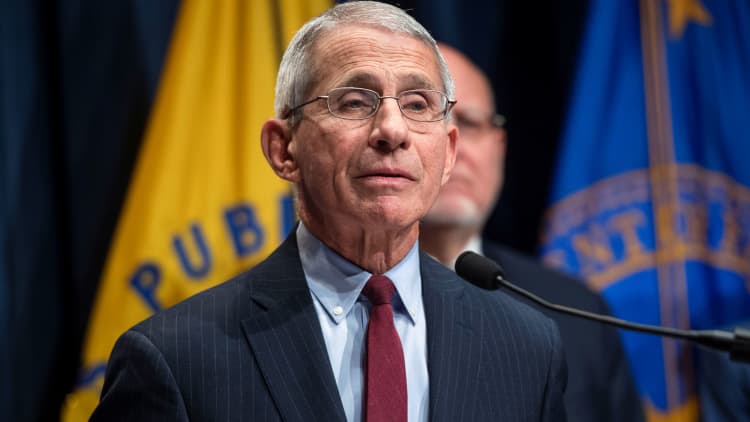
Dr. Anthony Fauci of the National Institutes of Health told CNBC on Monday that a quarter of China's coronavirus cases require intensive treatment.
"About 25% of them have very serious disease, requiring relatively intensive or really intensive care," said the director of the NIH's National Institute of Allergy and Infectious Diseases.
The NIH is part of the U.S. Department of Health and Human Services.
China's National Health Commission said Monday that the confirmed coronavirus cases in China increased to 17,205. The death toll rose to 361 there — with one additional fatality in the Philippines, the first outside China.
The World Health Organization said there's been more than 150 coronavirus cases in about two dozen countries outside of China. Last week, WHO declared the virus a global health emergency.
"It's escalating," Fauci said on "Squawk on the Street." "The number of cases that increase from one day to another is clearly going up in a very steep slope."
There are many health-care professionals and analysts, including Fauci, who believe the number of coronavirus cases to be much higher.
"There are probably a lot more people who were infected in China who have not been really counted ... because they were either asymptomatic or their symptoms were so light that they didn't come to the attention of health authorities," Fauci said. "The number is probably much larger."
Countries around the globe have responded to the coronavirus outbreak by putting preventative measures, such as travel restrictions, in place. Companies, including Starbucks and Apple, have temporarily closed some China operations.
The U.S., which has 11 confirmed cases, instituted on Sunday a mandatory 14-day quarantine of Americans who in the last two weeks have visited Hubei province in China, where Wuhan, the center of the outbreak, is located, in a move to help prevent further spread. The Trump administration is also instructing Americans returning to the U.S. to undergo a two-week self quarantine if they have been in other parts of mainland China in the last 14 days.
Fauci credits "good public health measures" in the United States for helping to stop "sustained transmission" of the virus in America.
"As the entry into the United States of potentially infected people is diminished because of the travel restrictions on both sides ... I think you are going to see a dampening down" of U.S. cases, he added.
Dr. Gregory Poland, director of the Mayo Clinic's Vaccine Research Group, told CNBC earlier Monday that Americans can help protect themselves from the coronavirus by using the same hygiene best-practices they use for the regular flu.
The coronavirus and the regular flu have similar symptoms, which some health officials fear will cause misdiagnoses.
Poland said on "Squawk Box" that the worldwide coronavirus outbreak is "basically at a pandemic now."
Correction: The U.S. has instituted a mandatory 14-day quarantine of Americans who in the last two weeks have visited Hubei province in China, where Wuhan, the center of the outbreak, is located. The Trump administration is also instructing Americans returning to the U.S. to undergo a two-week self quarantine if they have been in other parts of mainland China in the last 14 days. An earlier version mischaracterized the quarantines.


